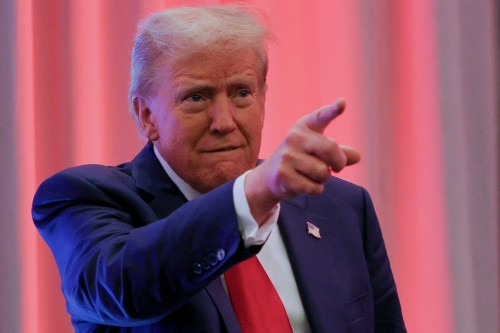By Luc Cohen
NEW YORK (Reuters) -Prosecutors who secured Donald Trump’s conviction over a hush money payment to a porn star opposed on Tuesday his stated hope to have the case dismissed now that he is president-elect and asked a judge to set a schedule to litigate the matter.
Trump, 78, had been scheduled to be sentenced on Nov. 26, but New York State Supreme Court Justice Juan Merchan last week put all proceedings in the case on pause at the request of Manhattan District Attorney Alvin Bragg’s office.
The prosecutors said they would accept a delay but asked Merchan to set a deadline for Trump to formally seek dismissal of the case. The prosecutors suggested that they then be given until Dec. 9 to oppose Trump’s bid.
They also said consideration must be given to deferring all proceedings until after Trump finishes his four-year presidential term that begins on Jan. 20, but stopped short of explicitly endorsing that option.
Steven Cheung, a spokesperson for Trump’s campaign, in a statement called Bragg’s position “a total and definitive victory” for Trump.
Trump, president from 2017-2021, is hoping to enter office for a second term unencumbered by any of the four criminal cases he has faced and which some opponents had predicted would derail his 2024 candidacy to return to the White House.
The Republican Trump was convicted in May of falsifying business records to cover up a $130,000 payment his former lawyer Michael Cohen made to adult film actress Stormy Daniels for her silence before the 2016 election about a sexual encounter she says she had with Trump, who denies it.
It was the first time a U.S. president – former or sitting – had been convicted of or charged with a criminal offense.
The prosecutors had asked for more time to consider next steps in the case, citing the need to balance the “competing interests” between having the criminal case go forward and protecting the office of the president.
Trump pleaded not guilty in the case, which he has long portrayed as a politically motivated attempt by Bragg, a Democrat, to interfere with his campaign.
His defense lawyers urged Merchan to dismiss the case, arguing that having it loom over him while he was president would cause what they called “unconstitutional impediments” to his ability to govern.
Trump’s lawyers also argued his conviction should be vacated and the charges dismissed because of the U.S. Supreme Court’s ruling in July that presidents cannot be prosecuted over their official acts, and that evidence of their official acts cannot be used in trials over personal behavior.
Bragg’s office said that its case dealt with purely personal conduct.
Falsification of business records is punishable by up to four years in prison. Before he was elected, experts said it was unlikely – but not impossible – that Trump would face time behind bars, with punishments such as a fine or probation seen as more likely.
Trump’s victory over Democratic Vice President Kamala Harris in the Nov. 5 election made the prospect of imposing a sentence of jail or probation even more politically fraught and impractical, given that a sentence could have impeded his ability to conduct the duties of the presidency.
Trump was charged in three additional state and federal cases in 2023, one involving classified documents he kept after leaving office and two others involving his efforts to overturn his 2020 election loss.
A Florida-based federal judge in July dismissed the documents case. The Justice Department is now evaluating how to wind down the federal election-related case. Trump also faces state criminal charges in Georgia over his bid to reverse his 2020 loss in that state, but the case remains in limbo.
As president, Trump would have no power to shut down the New York or Georgia cases because they were filed in state courts. His Justice Department may close the federal cases.
(Reporting by Luc Cohen in New York; Editing by Noeleen Walder, Richard Chang and Howard Goller)











